Unit one 2
三年级下册英语素材资料 Unit 2 I’m in Class One, Grade Three
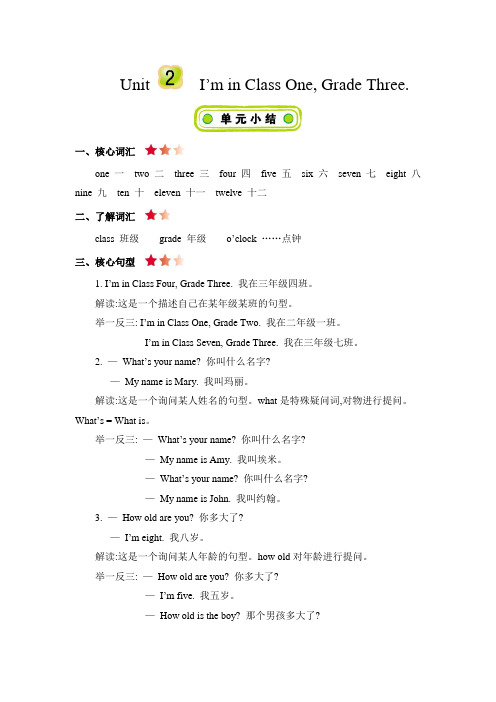
Unit I’m in Class One, Grade Three.
一、核心词汇
one 一two 二three 三four 四five 五six 六seven 七eight 八nine 九ten 十eleven 十一twelve 十二
二、了解词汇
class 班级grade 年级o’clock ……点钟
三、核心句型
1. I’m in Class Four, Grade Three. 我在三年级四班。
解读:这是一个描述自己在某年级某班的句型。
举一反三: I’m in Class One, Grade Two. 我在二年级一班。
I’m in Class Seven, Grade Three. 我在三年级七班。
2. —What’s your name? 你叫什么名字?
—My name is Mary. 我叫玛丽。
解读:这是一个询问某人姓名的句型。
what是特殊疑问词,对物进行提问。
What’s = What is。
举一反三: —What’s your name? 你叫什么名字?
—My name is Amy. 我叫埃米。
—What’s your name? 你叫什么名字?
—My name is John. 我叫约翰。
3. —How old are you? 你多大了?
—I’m eight. 我八岁。
解读:这是一个询问某人年龄的句型。
how old对年龄进行提问。
举一反三: —How old are you? 你多大了?
—I’m five. 我五岁。
—How old is the boy? 那个男孩多大了?。
unit1-2单词短语句子 (1)
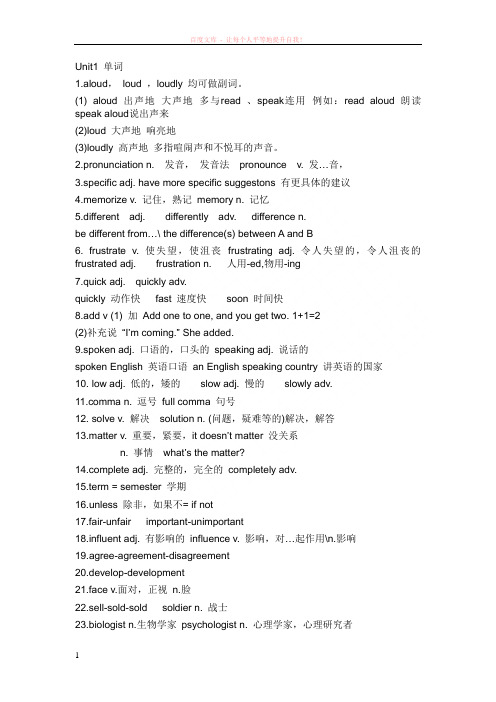
1.aloud,loud ,loudly 均可做副词。
(1) aloud 出声地大声地多与read 、speak连用例如:read aloud 朗读speak aloud说出声来(2)loud 大声地响亮地(3)loudly 高声地多指喧闹声和不悦耳的声音。
2.pronunciation n. 发音,发音法pronounce v. 发…音,3.specific adj. have more specific suggestons 有更具体的建议4.memorize v. 记住,熟记memory n. 记忆5.different adj. differently adv. difference n.be different from…\ the difference(s) between A and B6. frustrate v. 使失望,使沮丧frustrating adj. 令人失望的,令人沮丧的frustrated adj. frustration n. 人用-ed,物用-ing7.quick adj. quickly adv.quickly 动作快fast 速度快soon 时间快8.add v (1) 加Add one to one, and you get two. 1+1=2(2)补充说“I’m coming.” She added.9.spoken adj. 口语的,口头的speaking adj. 说话的spoken English 英语口语an English speaking country 讲英语的国家10. low adj. 低的,矮的slow adj. 慢的slowly adv.ma n. 逗号full comma 句号12. solve v. 解决solution n. (问题,疑难等的)解决,解答13.matter v. 重要,紧要,it doesn’t matter 没关系n. 事情what’s the matter?plete adj. 完整的,完全的completely adv.15.term = semester 学期16.unless 除非,如果不= if not17.fair-unfair important-unimportant18.influent adj. 有影响的influence v. 影响,对…起作用\n.影响19.agree-agreement-disagreement20.develop-development21.face v.面对,正视n.脸22.sell-sold-sold soldier n. 战士23.biologist n.生物学家psychologist n. 心理学家,心理研究者ed to do sh. 过去常常做某事2.terrify v. 使害怕,使恐惧terrified adj. 害怕的,恐惧的be terrified of > be afraid of3.on adj. 开着的,接通的,工作着的off adj. 关着的4.candy (pl.) candies5.daily\friendly 是形容词而不是副词6.die v. 死death n. 死7.exact adj. 正确的,准确的exactly adv. 正,恰恰8.attention n. 注意,专心,留心pay attention to 对…注意9.waste v. 浪费,滥用Unit1 非常非常重要短语1.犯错,出错make mistakes=make a mistake2.以后,随后later on3.没关系it doesn’t matter.4.害怕去做,不敢去做be afraid to do sth.\be afraid of n.\v-ing 非常害怕的,极度恐惧的be terrified of5.嘲笑,取笑laugh at 嘲笑某人,取笑某人laugh at sb.6.做笔记,做记录take notes7.(在词典,参考书等中)查阅,查找look up8.编造,组成,拼凑成make up9.处理,应付deal with10.将…视为regard…as11.生…的气,对…感到气愤be angry with生某人的气be angry with sb.12.(时间)过去,流逝go by13.尽力做… try one’s best14.突然中断,中止break offUnit2 非常非常重要短语1.过去常常,以前常常做某事used to do sth.2. sleep是动词,asleep是形容词。
unit 1-2

班级:_________ 姓名:____________ 学号:_________________Units 1-2Test One (A)1.Taking a plane is the quickest _________ to get to New York.A. TypeB. meansC. methodD. mode2. The child was _______ to the nurse’s care.A. committedB. givenC. promisedD. commandedCommit sb/sth to sth: give or transfer sb/sth to (a state or place) for safe keeping, treatment, etc.将某人(某事物)置于(某状态)或交与或转交某处保留,处理等)3. The baby is a new ______ to our family.A. additionB. Enlargement 放大C. Expansion扩张D. extension 延伸,扩展,电话分机4. A child’s character is greatly influenced by his home _______.A. settingB. environment自然环境和社会环境C. situationD. circumstance 情况,处境5. The teacher has ______ each of us a holiday task.A. givenB. electedC. deliveredD. assigned6. Dust had ______ during her absence.A. increasedB. collectedC. gatheredD. accumulated7. My mom’s encouragement _______ me to go on with my study.A. determinedB. decidedC. settledD. resolvedDetermine sb against sth 使某人决定不做某事8. Her illness is merely a ______ to avoid seeing him.A. methodB. planC. wayD. device 装置,设备;手段,策略9. There were no women in the committee ______ 1976, but now women are in a majority.A. priorB. previous toC. before toD. agoPrior to 在…之前10. We must ______ our attention on efficiency.A. payB. concentrateC. provideD. gather11. She has ______ 95 years of her life.A. finishedB. accomplishedC. achievedD. completedAccomplish:完成,实现,做成功;度完(时间);达到目的,实现任务12. _______ I quite understand why he refused to help her, I cannot agree that he was right not to do so.A. WhileB. IfC. BecauseD. When13. I’ve really got nothing to ______.A. complaintB. complainC. complaint ofD. complain of14. ______ you go on, you will find your English improved.A. WhenB. BecauseC. AsD. Although15. He gave up ______ abroad to pursue his studies.A. goB. to goC. goingD. went16. She treats him as if he ______ a stranger.A. wereB. beC. isD. would be17. Because of ______ the job, he decided to treat us to a meal.A. succeed to getB. succeed in gettingC. succeeding in gettingD. succeeding to get18. They were determined to set off in the next morning ______ our persuasion.A. according toB. in spite ofC. in addition toD. apart from19. The city ______ over 2000 such incidents last year.A. experiencedB. stoodC. happenedD. felt20. The whole journey ______ 3,300 kilometers.A. takesB. covers 通过,走完(若干里)C. includesD. extends21. Her old dream ______ round the world came back.A. to goingB. of goC. of goingD. to go22. In learning English, you must pay attention ______ to the meaning of a word, ______ to the way native speakers use it in their daily life.A. either, orB. not only, but alsoC. neither, norD. not, but23. The car was turned ______ and the driver was seriously injured.A. overB. downC. outD. around24. She could hardly believe her ______ .A. listeningB. earsC. hearing听力,听觉D. audition(拟进行表演者的)试演,试唱,试音25. The little boy went out ______.A. for himselfB. to himselfC. by himselfD. on himself26. The police asked us to ______ a tall man in a black hat.A. watch outB. watch forC. watch overD. watch out for27. How to ______ the contradictions correctly among the people is the key to develop steadily.A. dealB. handleC. hangD. do28. It was _____ of you to do that typing for me.A. helpfulB. favoriteC. usefulD. valuable29. We are responsible for the project. So, I felt ______ to mention it.A. freeB. bindC. sureD. bound30. – How long is your ______ to work?-- Only about fifteen minutes.A. journey旅行,行程B. tripC. travelD. voyage1.journey 应用范围很广, 指“有预定地点的陆上、水上或空中的单程长、短途旅行”, 一般来说, 它着重指“长距离的陆上的旅行”2.trip 为一般用语, 指“任何方式的, 从事业务或游览的旅行”, 往往着重于“短途旅行”, 在口语中, 可与journey 互换3.tour 指“以游览、视察、购物等为目的的旅行”, 常含有“最后回到原出发点”的意思4.voyage 主要指“乘船作水上旅行”, 也可指”空中旅行”5.excursion 指“娱乐性的短途旅行”Test One (B)1.The boatman had to ______ himself with live fish before rescue came.A. standB. keepC. sustain 维持某人的生命或存在D. support2. He ______ his friend in the crowdA. sought out找出B. found outC. looked out小心,当心,留神D. reached out 伸出3. The television receiver is an electronic ______ .A. machineB. toolC. deviceD. organ4. They are anxious to develop friendly ______ with their neighboring countries.A. connectsB. relationsC. joinsD. contacts5. The manager thought he was a ______ person and told him all about the new plan.A. confidentB. famousC. reliableD. dependent6. She only ______ her son’s marriage long after the event.A. knew of 知道某人(或某事物的)情况B. learntC. knewD. learnt of 听说7. The teaching ______ of this college is excellent.A. staffB. groupC. crewD. team8. He gave up his seat on the bus to an old woman standing ______.A. besidesB. nearlyC. nearbyD. around9. We can’t act on your advice. ______, thank you for giving it.A. AndB. ButC. MoreoverD. Nevertheless10. Whether an operation should be made in this situation ______ very much on the patient’s general condition.A. reliesB. dependsC. countsD. concentrates11. Do you know how many ______ there are in this English book?A. wordsB. vocabularyC. languagesD. tongueswords是多数的word,翻译成单词、词语都可以。
英语必修一unit2作文范文(合集5篇)

英语必修一unit2作文范文(合集5篇)英语必修一unit2作文范文第1篇Everyone in our life should face something we hate,or some one we never want to face.So,how can we face the difficulties.Difficulties happen all the time,but do not be afraid of go ahead withe what we are doing with a cry and have a smile ,which is the best way we can use to beat give up and do your best for tomorrows yourself ,believe in that tomorrow will be better.You see,no matter what difficulties we face,we always smile,dont we?So,earthquake we are not afraid because of our smile;hXnX, we are not afraid because of our smile....Together forever no matter what happens,and, with a smile,trust that everything can be soved!英语必修一unit2作文范文第2篇The failure is the mother of how many people are actually able to grasp the mystery?General speaking, people are afraid of should we fail to face?The key issues were to understand and transform the world, the defeat was in face of failure is the only correct way to success of our can sum up the lesson from many mistakes, we should be close to success andbelieve that failure is only failure of the people tend to be alone, around on his support, even a comforting word, can add to his great power.In a word,failure are not terrible. Horrible is you dont have the courage to face defeat feeling!英语必修一unit2作文范文第3篇As we all know, _Failure is the mother of success._ But few people can really understand what the saying means.In the world, I am sure that no one dare say he hasnt met any trouble all his life. So we must face failure. In fact, failure is not fearful, but important thing is how to face it correctly. Facing failure, people will never take their fate lying will try their best to work harder and harder until at last they succeed.Not being courageous to face setbacks, people have no chance to enjoy the pleasure of success. So they have nothing to do but feel sad and empty all day and all night. In fact, they lose the chance of success themselves.My friend, whenever in trouble, please remember, _Failure is the mother of success._英语必修一unit2作文范文第4篇第一步:审题谋篇第二步:推敲词汇1.__pay a visit to__参观2.__a great wonder__一个大的奇迹3.__create__创造4.__have a long history__有悠久的历史5.__tourist attraction__旅游景点6.__attract__吸引7.__all over the world__全世界8.__hear from__收到来信第三步:由词扩句1.我和我的父母计划去看长城。
Unit1 & Unit 2
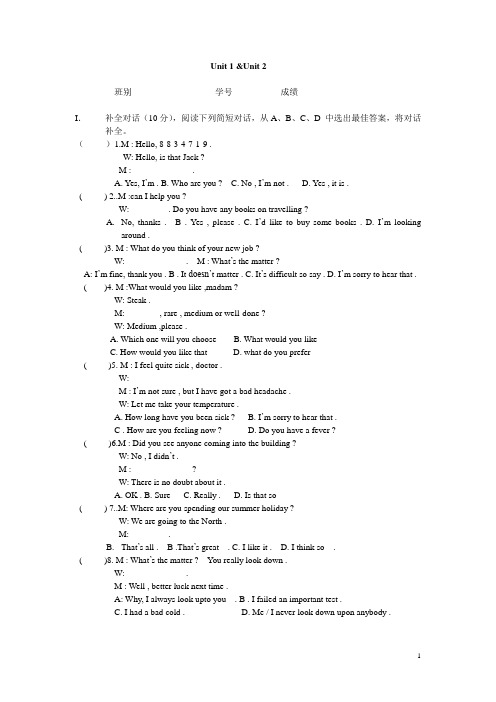
Unit 1 &Unit 2班别________________ 学号_________ 成绩_________________I.补全对话(10分),阅读下列简短对话,从A、B、C、D 中选出最佳答案,将对话补全。
()1.M : Hello, 8-8-3-4-7-1-9 .W: Hello, is that Jack ?M : _____________ .A. Yes, I‟m .B. Who are you ?C. No , I‟m not .D. Yes , it is .( ) 2..M :can I help you ?W: ________ . Do you have any books on travelling ?A.No, thanks . B . Yes , please . C. I‟d like to buy some books . D. I‟m lookingaround .( )3. M : What do you think of your new job ?W: _____________ . M : What‟s the matter ?A: I‟m fine, thank you . B . It doesn‟t matter . C. It‟s difficult so say . D. I‟m sorry to hear that . ( )4. M :What would you like ,madam ?W: Steak .M: _______ , rare , medium or well-done ?W: Medium ,please .A. Which one will you chooseB. What would you likeC. How would you like thatD. what do you prefer( )5. M : I feel quite sick , doctor .W: _________M : I‟m not sure , but I have got a bad headache .W: Let me take your temperature .A. How long have you been sick ?B. I‟m sorry to hear that .C . How are you feeling now ? D. Do you have a fever ?( )6.M : Did you see anyone coming into the building ?W: No , I didn‟t .M : _____________ ?W: There is no doubt about it .A. OK .B. SureC. Really .D. Is that so( ) 7..M: Where are you spending our summer holiday ?W: We are going to the North .M: ________ .B.That‟s all . B .That‟s great .C. I like it .D. I think so .( )8. M : What‟s the matter ? You really look down .W: _____________ .M : Well , better luck next time .A: Why, I always look upto you . B . I failed an important test .C. I had a bad cold .D. Me / I never look down upon anybody .( )9. M :Excuse me , _______ ?W: Yes , I‟ll have a hamburger with French fries .M:, OK ,please wait for a moment . It will be served in a second .W: Thank you ..A. are you ready to orderB. What do you want to eatC. Have you decided what to haveD. who …d like to order( )10. M :We‟d better hurry . Do you think we will be in time for class ?W: _________M : Why don‟t we run ?W: Go ahead , but I think it is useless .A. Sure. We have lots of timeB. Don‟t worry .We‟ll get there in timeC . Yes, there is enough time D. No, I‟m afraid not . It‟s too lateII . 单选题(60 分)()1.Where will you go for your vacation ?A. 活动 B 假期 C.计划 D. 旅行()2. Shall we go skiing next week ?A. 爬山B.野餐 C 滑雪 D. 旅游( )3. What an wonderful speech!A. 有趣的B.令人兴奋的C. 感兴趣的D. 精彩的( )4. When we heard the amusing story , we laughed into tears .A. 感到兴奋的 B 有趣的 C 精彩的D令人悲伤的()5.They are going on a trip this weekend with their friends .A. 船B地图 C 假期 D 旅行()6.She is a career woman .A. 事业 B 家庭 C.已婚 D. 家务()7.It is a typical example .A. 生动的 B 日常的 C. 典型的 D. 难忘的()8.The old lady slipped on the floor .A. 拍打 B 行走 C.滑倒 D. 爬行的()9.My mother is a housewife .A. 家庭主妇 B 房奴 C. 妻子 D. 妇女()10.His father never does any family chores .A. 活动 B 选择 C.家务活 D. 修理( )11.Titanic is one of the best movies I have ever seen .A. 悲剧 B 电影 C. 电视 D. 运动()12. Did you do anything special last weekend ?A. 特别的B.一般的 C 感人的 D. 轻松的( )13. Country music is difficult from rock music .A. 乡村音乐B.流行音乐C. 爵士乐D. 摇滚乐( )14. I went to the gym and played volleyball with my friends .A. 网吧 B 体育馆 C 游戏D电影院()15.I preferred comedy .A. 戏剧B动作电影 C 悲剧 D 恐怖电影()16.It is a moving film .A. 枯燥的 B 有趣的 C.恐怖的 D. 动人的()17.I invited friends over to watch the movies together .A. 认为…..胜过 B 与……毫不相干 C. 邀请…..到家中 D. 丢失()18.But my brother slept through the best part .A. 一直以来 B 一直在睡 C.一直在看 D. 一直在听()19.Harry fell asleep in front of the TV. .A. 躺着 B 摔倒了 C.走进 D. 睡着了()20.What do you think of jazz music ?A. 仔细考虑 B 认为…...怎么样 C.喜欢 D. 想起()21.I like playing _____ piano while my brother likes playing _____ basketball .A. the , the B the , / C. / , / D. /, the()22.Did you ____ fishing last Sunday ?A. go B went C. gone D. going()23.My father is ________ engineer .A. / B a C. an D. the()24.I helped mother _____ the houseworkA. do B doing C. does D. did()25.I enjoy _____ to music in my spare time .A. to listen B listening C. listen D. did()26.The family often _____ TV after supper .A. watches B watching C. watch D .to watch()27._____ fun we had at the party .A. How great B what a C. What great D. How a()28.When we _____Shanghai , it was raining heavily .A. arrived in B arrived at C. arrived D. arriving()29.Ben‟s father didn‟t do _____ housework at home .A. many B any C. some D. much()30.We will make a trip _____ Beijing this summer .A. in B at C. to D. for()31.The boy _____ the film two days ago .A. see B saw C. has seen D. seeing()32.Steven _____ the school dancing club last year .A. joined B joining C. to join D. joins( )33. As soon as they _______ to the hotel , they held a meeting at once .A. getB. gettingC. gotD. went()34.The rain _____ for three hours yesterday . .A. last B lasting C. lasts D. lasted()35.I heard that Jim _____ a bad cold last week .A. catching B catch C. catches D. caught()36.The sun _____ brightly that morning ..A. shining B shone C. was shining D. shines()37.I _____a mistake . Please don‟t be angry with me .A. will make B made C. make D. makes()38._____they enjoy themselves at yesterday‟s party ?A. Do B Did C. Does D. Are()39.The teacher asked the students _____ in the class .A. to not talk B not to talk C. not talk D. talk not()40.The woman slipped on the floor and _____ her left foot .A. hurt B hurted C. hurts D .hurting()41._____TV too much is bad for your health..A. Watch B Watched C. Watching D. too watch()42.He spends his free time ____ books .A readsB reading C. to read D. read()43.Do you know the girl ________ Mary ?A. called B calling C. calls D. to call()44.Shanghai is one of the _____ in China .A. the largest city B the largest cities C. the largest cities D. largest city()45.What type of music _____ she_______ best ?A. does , like B does , like C. is , like D. is , likes(46._____ do you ______ the movie ?A. What , like B How , think of C. What , think of D . How , think()47.Is there _____ in today‟s newspaper ?A. anything interesting B interesting anything C. something interestingD. interesting something()48.I prefer country music _____jazz .A. for B than C. to D. in()49.--- _____ was your holiday ?---It was great .A. What B How C. When D. Who()50.You must _____ your classroom clean and tidy .A keepB kept C. let D. keeping()51.I like light music _____ I‟m getting old .A. because of B because C. so D. in()52.Although they were very tired , _____ they went on working .A. but B so C. / D. for( )53. Country music is _______ than rock music .A. more peacefullyB. much peaceful C .more peaceful D. much peacefully()54.__How about going to the zoo ?___It sounds _______ .A . WellB great C. badly D. best()55.He _____ asleep in front of the TV last night .A. fell B felt C. falls D. falling()56.I _____ the Internet and chatted with my friend .A. Surfing B surfs C. was surfed D. surfed()57.They arrived here _____ 11:00 a. m .A. around B .in C. on D. for()58.He didn‟t like this movie . He thought it was _____ .A. interestingB. boredC. boringD. interested()59.I like _____ my mind busy .A. keep B keeping C. keeps D. to keep()60.They spend a _____ holiday .A. relaxed B relaxes C. relaxing D .to relaxIV .完形填空。
创新大学英语预备级Unit1Part2译文及答案
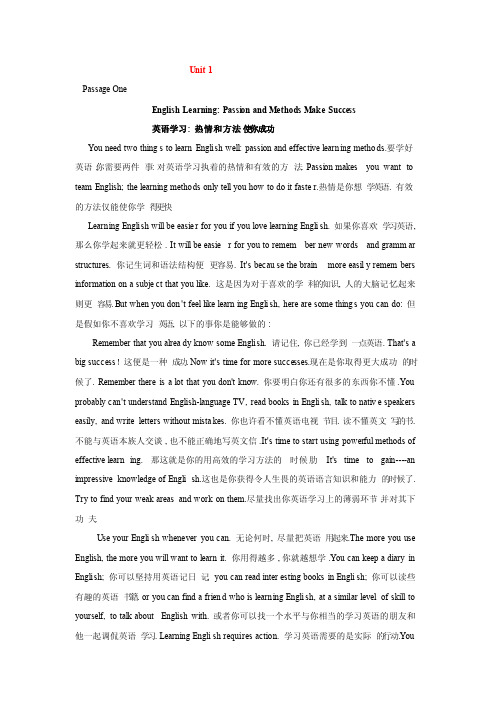
Unit 1Passag e OneEnglis h Learni ng: Passio n and Method s Make Succes s英语学习: 热情和方法使你成功You need two things to learnEnglis h well: passio n and effect ive learni ng method s.要学好英语,你需要两件事:对英语学习执着的热情和有效的方法.Passio n makesyou want to team Englis h; the learni ng method s only tell you how to do it faster.热情是你想学英语. 有效的方法仅能使你学得更快Learni ng Englis h will be easier for you if you love learni ng Englis h. 如果你喜欢学习英语,那么你学起来就更轻松.It will be easier for you to rememb er new wordsand gramma r struct ures.你记生词和语法结构便更容易. It's becaus e the brainmore easily rememb ers inform ation on a subjec t that you like. 这是因为对于喜欢的学科的知识, 人的大脑记忆起来则更容易. But when you don't feel like learni ng Englis h, here are some things you can do: 但是假如你不喜欢学习英语, 以下的事你是能够做的:Rememb er that you alread y know some Englis h. 请记住, 你已经学到一点英语. That's a big succes s!这便是一种成功. Now it's time for more succes ses.现在是你取得更大成功的时候了. Rememb er thereis a lot that you don't know. 你要明白你还有很多的东西你不懂. You probab ly can't unders tandEnglis h-langua ge TV, read booksin Englis h, talk to native speake rs easily, and writeletter s withou t mistak es. 你也许看不懂英语电视节目. 读不懂英文写的书. 不能与英语本族人交谈, 也不能正确地写英文信. It's time to startusingpowerf ul method s of effect ive learni ng. 那这就是你的用高效的学习方法的时候肋It's time to gain----an impres siveknowle dge of Englis h.这也是你获得令人生畏的英语语言知识和能力的时候了. Try to find your weak areasand work on them.尽量找出你英语学习上的薄弱环节.并对其下功夫.Use your Englis h whenev er you can. 无论何时, 尽量把英语用起来.The more you use Englis h, the more you will want to learnit. 你用得越多, 你就越想学. Y ou can keep a diaryin Englis h; 你可以坚持用英语记日记, you can read intere sting booksin Englis h; 你可以读些有趣的英语书籍. or you can find a friend who is learni ng Englis h, at a simila r levelof skillto yourse lf, to talk aboutEnglis h with. 或者你可以找一个水平与你相当的学习英语的朋友和他一起调侃英语学习. Learni ng Englis h requir es action. 学习英语需要的是实际的行动.Youmay know all the learni ng tips, but if you don't startdoingthings, you will achiev e nothin g.一切学习方法你都懂, 但无行动.你将会一事无成.Passag e One1)Accord ing to the writer, learni ng Englis h well requir es ____________.A) both passio n and effect ive method sB) either passio n or effect ive method sC) passio nD) effect ive method s2) If you feel like learni ng Englis h,_______A) you can speakEnglis h wellB) your braineasily rememb ers everyt hingthat you likeC) you can more easily rememb er new wordsand gramma r struct uresD) you can use your Englis h any time3) What are your probab le weakne ssesof learni ng Englis h accord ing to the passag e?A) You cannot writeletter s correc tly.B) You can not only unders tandEnglis h-langua ge TV, but talk to native speake rs easily,C) You cannot read Englis h books.D) Both A) and C).4) The more you use Englis h,A) the more you will find it diffic ult B) the more mistak es you will makeC) the more boredyou will become D) the more you will want to learnit5) What are the effect ive learni ng method s accord ing to the writer?A) Keepin g a diaryin Englis h, and talkin g aboutEnglis h with your friend.B) Buying some intere sting books.C) Singin g Englis h songs.D) Knowin g all the learni ng tips.。
Key to reading comprehension Unit1-2
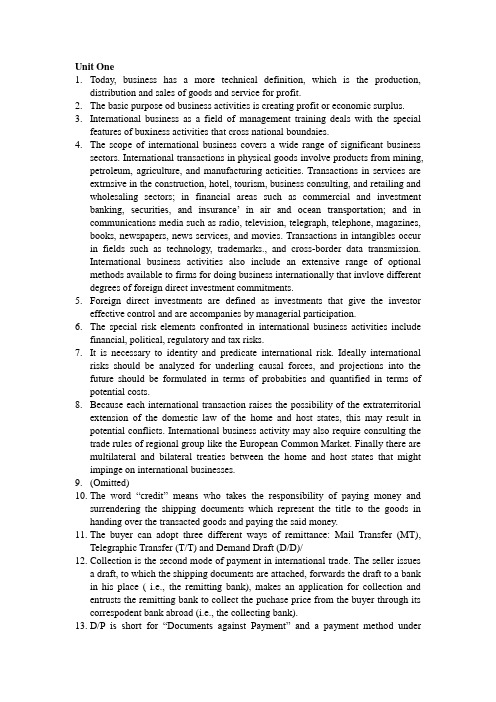
Unit One1.Today, business has a more technical definition, which is the production,distribution and sales of goods and service for profit.2.The basic purpose od business activities is creating profit or economic surplus.3.International business as a field of management training deals with the specialfeatures of buxiness activities that cross national boundaies.4.The scope of international business covers a wide range of significant businesssectors. International transactions in physical goods involve products from mining, petroleum, agriculture, and manufacturing acticities. Transactions in services are extrnsive in the construction, hotel, tourism, business consulting, and retailing and wholesaling sectors; in financial areas such as commercial and investment banking, securities, and insurance’ in air and ocean transportation; and in communications media such as radio, television, telegraph, telephone, magazines, books, newspapers, news services, and movies. Transactions in intangibles occur in fields such as technology, trademarks., and cross-border data transmission.International business activities also include an extensive range of optional methods available to firms for doing business internationally that invlove different degrees of foreign direct investment commitments.5.Foreign direct investments are defined as investments that give the investoreffective control and are accompanies by managerial participation.6.The special risk elements confronted in international business activities includefinancial, political, regulatory and tax risks.7.It is necessary to identity and predicate international risk. Ideally internationalrisks should be analyzed for underling causal forces, and projections into the future should be formulated in terms of probabities and quantified in terms of potential costs.8.Because each international transaction raises the possibility of the extraterritorialextension of the domestic law of the home and host states, this may result in potential conflicts. International business activity may also require consulting the trade rules of regional group like the European Common Market. Finally there are multilateral and bilateral treaties between the home and host states that might impinge on international businesses.9.(Omitted)10.The word “credit” means who takes the responsibility of paying money andsurrendering the shipping documents which represent the title to the goods in handing over the transacted goods and paying the said money.11.The buyer can adopt three different ways of remittance: Mail Transfer (MT),Telegraphic Transfer (T/T) and Demand Draft (D/D)/12.Collection is the second mode of payment in international trade. The seller issuesa draft, to which the shipping documents are attached, forwards the draft to a bankin his place ( i.e., the remitting bank), makes an application for collection and entrusts the remitting bank to collect the puchase price from the buyer through its correspodent bank abroad (i.e., the collecting bank).13.D/P is short for “Documents against Payment” and a paymen t method underwhich the exporter is to ship the goods ordered and deliver the relative shipping docvuments to the buyer abroad through the remitting bank and the collecting bank with instructions not to release the documents to the buyer until the payment for the goods is made.14.Packing list is made out by a seller when a sales is effected in foreign trade. It is adocument that indicates the name of the goods, the net weight, the gross weight and the complete inner packing specifications and contents of each package.15.(Omitted)16.The World Trade Organization (WTO) was established on 1 January, 1995. It isthe legal and institutinal foundation of th emultilateral trading system. It provides the principal contractual obligations determining how governements frame and implement domestic trade legistlation and regulations. And it is the platfom on which trade relations among countries evolove through collective debate, negotiation and adjudication.17.The WTO is based in Geneva. Switzerland.18.Its fundamental functions are:--- administering and implementing the multilateral and plural-lateral trade agreements which together make up the WTO;---acting as a forum for multilateral trade negotiations;---seeking to resolve trade disputes;---overseeing national trade policies; and---cooperating with other international institutions involved in global economic policy-making.19.The structure of the WTO is dominated by its highes authority, the MinisterialConferent, composed of representatives of all WTO members, which is required to meet at least every two years and which can make decisions on all matters under any of the multilateral trade agreements.Unit Two1.Sole proprietorship has the following disadvantages:First, the ower is exposed to unlimited liability. That means the owner is personally liable for all debts of the business. These debts may be incurred as a result of a contract obligation or as result of tort liability.Second, the sole proprietorship is normally not in the best position to raise large sums of money because its ability to repay loans is limited by the assets of the individual proprietorThe third disadvantage is the sole proprietorship’s lack of coutinutiy.2.The chief differences between general partnership and limited partnership are that:(1)One or more partners in the limited partnership have limited liability --- that is,their liability is limited to the extent of their investment in the partnership --- whereas all partners in a general partnereship have unlimited liability.(2)Limited partners have no control over the everyday managemtn.3.Although general partnership is regarded as an entity in itself in the course ofday-to-day business activities, the common law does not recognize it as a legal entity, but usually as an aggregation of individuals. Thus, a partnership is not a fictional person with a distict legal existence apart from its members.4.Because the existence of such an agreement (articles of partnership) helps to avoidconfilict by clarifying the rights and responsibilities of the parties.5.The following has to be dealt with:The liquidation of the partnership is to be carried out;Business affairs are to be put in order;Receivables are to be collected;Accountings are to be made;Payments to creditors are made;The remainging assets are distributed to the partners.6.Because they are primarily inbvestors and cannot take an active role in the dailymanagemtn or operation of the business.7.Advantage: Joint-stock companies can be created with little formality with nospecfic chartering requirements and no initial capital outlay.Disadvantages: The shareholders of the joit-stock comapay are personally liable for all the association’s obligations. Convesely, they share he profits in proportion to their controlling interest in the company.8.Because a corporation is an artificial being created by legislation. As such, acorporation can purchses, hold, and sell property in its own name. It enters into contracts in its own name. It can sue in its own name. It is a tax-paying entity.9.The feature that the shareholders enjoy limited liability make a corporationattractive because a shareholder can lose only what he or she invests. Creditors cannot reach the personal assets of the shareholder to satisfy the debt.10.Make a brief comparison between sole proprietorship, partnership and。
研究生综合英语3 unit 1, 2,3,7,8 原文+译文+重点【辛辛苦苦总结的期末资料】

1.Unit OneA Question of Degree对学位的质疑Perhaps we should rethink an idea fast becoming an undisputed premise of American life that a college degree is necessary(and perhaps even a sufficient) precondition for success.I do not wish to quarrel with the assumptions made about the benefits of orthodox education.I want only to expose its false god:the four-year, all-purpose,degree-granting college,aimed at the so-called college-age population and by now almost universally accepted as the stepping-stone to“meaningful”and “better”jobs.What is wrong with the current college/work cycle can be seen in the following anomalies:we are selling college to the youth of American as a take-off pad for the material good life.College is literally advertised and packaged as a means for getting more money through“better”jobs at the same time that Harvard graduates are taking jobs as taxi drivers.This situation is perversion of the true spirit of a university,a perversion of a humane social ethic and,at bottom,a patent fraud.To take the last point first,the economy simply is not geared to guaranteeing these presumptive “better”jobs;the colleges are not geared to training for such jobs;and the ethical propriety of the entire enterprise is very questionable.We are by definition(rather than by analysis)establishing two kinds of work:work labeled“better”because it has a degree requirement tagged to it and nondegree work,which,through this logic, becomes automatically“low level”.This process is also destroying our universities.The“practical curriculum”must become paramount;the students must become servants of big business and big government.Under these conditions the university can no longer be an independent source of scientific and philosophic truth-seeking and moral criticism.Finally,and most important,we are destroying the spirit of youth by making college compulsory at adolescence,when it may be least congruent with emotional and physical needs;and we are denying college as an optional and continuing experience later in life,when it might be most congruent with intellectual and recreational needs.Let me propose an important step to reverse these trends and thus help restore freedom and dignity to both our colleges and our workplaces.We should outlaw employment discrimination based on college degrees.This would simply be another facet of our“equal-opportunity”policy and would add college degrees to sex,age, race,religion and ethnic group as inherently unfair bases for employment selection.People would,wherever possible,demonstrate their capacities on the job.Where that proved impractical,outside tests could still serve.The medical boards,bar exams,mechanical,mathematical and verbal aptitude tests might still be used by various enterprises.The burden of proof of their legitimacy,however,would remain with the using agencies.So too would the costs.Where the colleges were best equipped to impart a necessary skill they would do so,but only where it would be natural to the main thrust of a university endeavor.The need for this rethinking and for this type of legislation may best be illustrated by a case study.Joe V.is a typical liberal-arts graduate,fired by imagination art and literature.He took a job with a large New York City Bank,where he had the opportunity to enter the“assistant manager training program”.The trainees rotated among different bank departments to gain technical know-how and experience and also received classroom instruction,including some sessions on“how to write a business letter.”The program was virtually restricted to college graduates. At the end of the line,the trainees became assistant bank managers:a position consisting largely of giving simple advice to bank customers and a modest amount of supervision of employees.Joe searched for some connection between the job and the training program,on the one hand,and his college-whetted appetites and skills on the other.He found nothing.In giving Joe preference for the training program,the bank had bypassed a few enthusiastic aspirants already dedicated to a banking career and daily demonstrating their competence in closely related jobs.After questioning his superiors about the system,Joe could only conclude that the“top brass”had some very diffuse and not-too-well–researched or even well-thought-out conceptions about college men. The executives admitted that a college degree did not of itself ensure the motivation or the verbal or social skills needed.Nor were they about what skills were most desirable for their increasing diverse branches.Yet they clung to the college prerequisite.Business allows the colleges to act as recruiting,screening and training agencies for them because it saves money and time.Why colleges allow themselves to act as servicing agents may not be as apparent.One reason may be that colleges are increasingly becoming conventional bureaucracies.It is inevitable,therefore,that they should respond to the first and unchallenged law of bureaucracy:expand!The more that college’s can persuade outside institutions to restrict employment in favor of theirclientele,the stronger is the college’s hold and attraction.This rational becomes even clearer when we understand that the budgets of public universities hang on the number of students“serviced”.Seen from this perspective,then,it is perhaps easier to understand why such matters as“university independence”or“the propriety”of using the public bankroll to support enterprises that are expected to make private profits, can be dismissed.Conflict of interest is difficult to discern when the interests involved are your own.What is equally questionable is whether a college degree,as such,is proper evidence that new skills that are truly needed will be delivered.A friend who works for Manpower Training Program feels that there is a clear divide between actual job needs and college-degree requirements.One of her chief frustration is the knowledge that many persons with ability to do paraprofessional mental-health work are lost to jobs they could hold with pleasure and profit because the training program also require a two-year associate art degree.Obviously,society can and does manipulate job status.I hope that we can manipulate it in favor of the greatest number of people.More energy should be spent in trying to upgrade the dignity of all socially useful work and to eliminate the use of human beings for any work that proves to be truly destructive of the human spirit. Outlawing the use of degrees as prerequisites for virtually every job that our media portray as“better”should carry us a long step toward a healthier society.Among other things,there is far more evidence that work can make college meaningful than that college can make work meaningful.My concern about this degree/work cycle might be far less acute;however,if everyone caught up in the system were having a good time.But we seem to be generating a college population that oscillates between apathy and hostility.One of the major reasons for this joylessness in our university life is that the students see themselves as prisoners of economic necessity.They have bought the media message about better jobs,and so they do their time.But the promised land of“better”job is, on the one hand,not materializing,and on the other hand the students is by now socialized to find such“better”jobs distasteful even if they were to materialize.One of the major improvements that could result from the proposed legislation against degree requirements for employments would be a new stocktaking on the part of all our educational pulsory schools,for example,would understand that the basic skills for work and family life in our society would have to be compressed into those years of schooling.Colleges and universities,on the other hand,might be encouraged to be unrestricted,as continuous and as open as possible.They would be released from the pressures of ensuring economic survival through a practical curriculum.They might best be modeled after museums.Hours would be extensive,fees minimal,and services available to anyone ready to comply with course-by-course demands.College under these circumstances would have a clearly understood focus,which might well be the traditional one of serving as gathering place for those persons who want to search for philosophic and scientific“truths”.This proposal should help our universities rid themselves of some strange and gratuitous practices.For example,the university would no longer have to organize itself into hierarchical levels:B.A.,M.A.,PH.D.There would simply be courses of greater and lesser complexity in each of the disciplines.In this way graduate education might be more rationally understood and accepted for what it is——more education.The new freedom might also relieve colleges of the growing practice of instituting extensive“work programs,”“internships”and“independence study”programs.The very names of these enterprises are tacit admissions that the campus itself is not necessary for many genuinely educational experiences.But,along with “external degree”programs,they seem to pronounce that whatever one has learned in life by whatever diverse and interesting routes cannot be recognized as increasing one’s dignity,worth,usefulness or self-enjoyment until it is converted into degree credits.The legislation I propose would offer a more rational order of priorities.It would help recapture the genuine and variegated dignity of workplace along with the genuine and more specialized dignity of the university.It would help restore to people of all ages and inclinations a sense of their own basic worth and offer them as many roads as possible to reach Rome.Vocabulary1.What look like generous hire-purchase terms are fundamentally just encouragement to the customer to spend his very last penny.【at bottom】2.A lot of viewers complain that there is too much crime and needless sex and violence on TV.【gratuitous无端的】3.I read a brief extract of Erving Goffman's new detective novel on the train and it has rather aroused my appetite for mysteries.【whetted引起】4.The article simply records the political changes of the last year,but it doesn't offer an honest appraisal of the government's achievements.【stocktaking评价估量】st week the city government warned that it would consider legislation to forbid smoking in public places.【outlaw不合法】6.Is it not something of an oddity to have a President of one political persuasion and a Prime Minister of another.【anomaly异常】7.These bigger companies have the money,but they don't always have the expertise to get the job done right.【know-how技能】8.As a member of the club,you must abide by its rules and regulations,otherwise you'll be punished severely.【comply with遵照,遵守】9.Asked whether she would like to work with Jack in my office,Mary replied"No" with obvious distaste.【patent显然的】10.There are many priorities,but reducing the budget deficit as soon as possible is more important than anything else.【paramount最高的】1.What monstrous perversion扭曲of the human spirit leads a sniper to open fire on a bus carrying children2.His writing is so diffuse冗长,obscure and overwrought that it is difficult to make out what it is he is trying to say3.We were in a hurry so we decided to bypass忽略Canterbury because we knew there'd be a lot of traffic there.4.The office director insisted that there was no question as to the propriety合适ofhow the benevolent funds were raised.5.Hector has been trying to get his job upgraded升级for years,but management won't because they'd have to pay him more.6.As a moody young adolescent,Mandy oscillates波动between joyous enthusiasm and melodramatic despair,most especially when it comes to boys.7·How successful they were would hang on坚持下去the speed with which the product could be distributed to the shops.8.Judging by the books sold,this young writer seems to have a strong hold over the reading public.9.If I were you,I would never allow my daughter to attend a such apathy冷漠exists among both the students and teachers.10.She rose,came up to me and said:“Could you provide me with a clear rationale 解释for taking this course of action"2.Unit Two The Middle Class中产阶级The middle class is distinguishable more by its earnestness and psychic insecurity than by its middle income.I have known some very rich people who remain stubbornly middle-class,which is to say they remain terrified at what others think of them,and to avoid criticism are obsessed with doing everything right.The middle class is the place where table manners assume an awful importance...The middle class,always anxious about offending,is the main market for"mouthwashes," and if it disappeared the whole"deodorant"business would fall to the ground.中产阶级有另别于其他阶级的特征是他们一本正经的生活态度和缺乏安全感的精神状态,而不是他们的中等收入。
Unit One(2)导案

Unit1 (第二课时)学习目标:1.Remember the words and phrases2. Grasp the main drills and language points.学习过程:自学引导:1. 牢记Unit 1单词,从lesson 到till(10分钟)自学指导:(1)大声拼读单词,掌握发音。
小组合作,A1-C1;A2-C2;B1-B2互相交流。
(2)记忆下列单词短语。
(3)默写单词短语。
(一)合上课本,默写单词。
A: 课,课程________________ 又一的,再一的_____________ 音乐会______________ 谁,什么人_____________日历____________ 明天___________后天__________________工作日____________ 临时照顾_______________邀请 _________训练__________ 化学____________ 美国的____________课题、项目__________比赛__________整个的________顺便来访___________空闲的__________ 直到---之时_________B.1.来参加晚会________________2.在周六下午_____________3.不得不做某事____________4.为一次考试而学习_________________4.去看医生_________________5.上一节钢琴课_____________6.拜访我的姨妈_____________7.去上吉他课______________8.去看电影(4)_____________ ____________ _____________ __________9. 有太多的作业___________________10. 这个周末________________11. 另一次、下一次_______________C. 找出并默写词组:(10分钟)自学指导:(1)根据下列所给汉语,在P3—P4页中划出相关短语。
高中英语必修一Unit2词组整理

高中英语必修一Unit2词组整理一词组1 have trouble (difficulty) (in)doing sth 做某事费劲/困难2 for example 例如3 in one`s free time 在某人的闲暇4 sculpt a sculpture 雕刻一座雕像5 paint a painting 画一幅画6 take a photo 拍一张照片7 at sea 在海上,感到困惑8 in the air 在空中,悬而未决9 get seasick/airsick/carsick晕船、晕机、晕车10 speak of 谈到11get back home 回家12 wonder at 对...感到惊讶13 fill/out a form 填表14 wind up 上发条,结束15 give advice on 就...提建议16 add..to...把...加到...17 lead to 导致18 used to do sth 过去惯常做某事19 agree with 同意某人的观点,和...一致20 with the help of 在...帮助下21 come across 偶遇,无意中发现22 the other way around 正好相反23 calm sb down 使某人平静24 refer to...as 把...称作...25 be made up of 由...制成/组成26 be short for 是...的缩写27 stop sb from doing sth 阻止某人做某事28 to my astonishment 使我感到吃惊的是...29 take place 发生30 be aware of 意识到,察觉到31 give clarification 给予澄清32 in need of 需要,缺少33 be based on 根据,以...34 ring a bell 听起来耳熟35 small potatoes 微不足道的人和物36 toilet water 花露水37 at sixes and sevens 乱七八糟38 green fingers 园艺技能39 pull up one’s socks 提高警惕40 broaden one`s knowledge 拓宽知识面41 the outside world 外部世界42 play safe 不冒险,求稳43 take a class 上课44 have a frog in one`s throat 讲话困难45 at the information desk 在服务台46 at the entrance 在入口处47 a student exchange programme学生交换项目48 get a positive comment 得到积极的评价49 do a good job 干得好50 give sb a better understanding of使某人更好地了解51 go off 离开,爆炸,突然发出响声。
九上英语(仁爱版)unit1-2重要知识和语法归纳

Unit 1 T opic 1 Section A一、词汇短语1.after class 2. come back from3. feel sorry for sb.4. have been (to )。
5.have taken part in /have helped / have spent /have done /have learnt6. in a disabled children’s home7. learn sth. from sb. Eg: We learn English from him every day .8. no time to do sth. 9.work / clean -----for---10. the whole holiday二、重点句子1.Did you have a good summer holiday?2.How was your trip?3.In one place I saw children working for a cruel boss.4.I felt sorry for them.5. A: Where have you been, Jane?B: I have been to Mount Huang with my parents.5.A: Where has he/she / kangkang been?B: He has been to an English training school to improve his English.7.There goes the bell。
=The bell is ringing.8. A: Have you spent the whole holiday working there?B: Y es, I have. / No,I haven’tspend---on sth./ spend---(in)doing sth.9. A: Have you ever taken part in any activities during this summer holiday?B: Y es, I have. No,I haven’t.(否定回答) Unit 1 T opic 1 SectionB一、词汇短语1.write an article about 2. have a hard life3. In the past4. in detail5. afford6.no chance to do sth.7. What’s more 8.help support their families9.the Chinese teenagers’ lives10.has gone (to)+比较:have been (to )11.in the open air 12. lose a competition二、重点句子1.Could you please----?2.Parents couldn’t afford education for their children.3.Most children had no chance to go to school.4.Our country has developed rapidly. 。
八下unit1-2同步习题
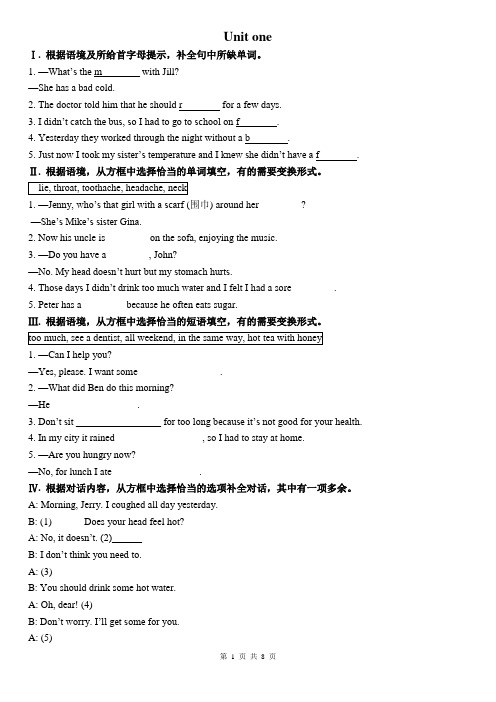
Unit oneⅠ. 根据语境及所给首字母提示,补全句中所缺单词。
1. —What’s the m with Jill?—She has a bad cold.2. The doctor told him that he should r for a few days.3. I didn’t catch the bus, so I had to go to school on f .4. Yesterday they worked through the night without a b .5. Just now I took my sister’s temperature and I knew she didn’t have a f . Ⅱ. 根据语境,从方框中选择恰当的单词填空,有的需要变换形式。
1. —Jenny, who’s that girl with a scarf (围巾) around her ________?—She’s Mike’s sister Gina.2. Now his uncle is ________ on the sofa, enjoying the music.3. —Do you have a ________, John?—No. My head doesn’t hurt but my stomach hurts.4. Those days I didn’t drink too much water and I felt I h ad a sore ________.5. Peter has a ________ because he often eats sugar.Ⅲ. 根据语境,从方框中选择恰当的短语填空,有的需要变换形式。
1. —Can I help you?—Yes, please. I want some ________________.2. —What did Ben do this morning?—He _________________.3. Don’t sit _________________ for too long because it’s not good for your health.4. In my city it rained _________________, so I had to stay at home.5. —Are you hungry now?—No, for lunch I ate _________________.Ⅳ. 根据对话内容,从方框中选择恰当的选项补全对话,其中有一项多余。
英语短篇小说教程本科课件Unit1、2
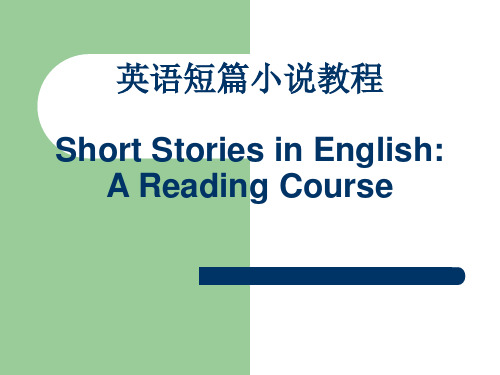
The narrator of a story may be:
reliable or unreliable, objective or subjective, fair or partial, sympathetic or detached, simple-minded or sophisticated, ignorant or insightful.
John M. Ellis: The Theory of Literary Criticism
The word literature is something like the word weed. A weed is just a plant that gardeners for one reason or another don’t want in the garden, but no plant has characteristics that clearly make it weed and not merely a plant.
The Random House Dictionary definition of the word “fiction”:
The class of literature comprising works of imaginative narration, esp. in prose form.
The four main categories of literature:
Reading and Textual Analysis
Langston Hughes: “Early Autumn”
Questions
1. Even though we call it a “short story,” is there much “story” in the usual sense of the word? Is “story” an inevitable part?
高一英语必修一unit2知识点

高一英语必修一unit2知识点高一英语必修一unit2知识1重点词汇、短语1. because of 因为、由于2. e up 走近、上来、提出3. actually 实际上、事实上4. base 以…为基础,根基5. at present 目前6. make use of 利用7. such as 例如8. mand 命令、指令、掌握9. request 请求、要求10. play a part/role in 扮演一个角色11. recognize 辨认出、承认、公认12. straight 直接、挺直、笔直的13. be different from 与…不同be the same as 和…一样14. one another 相互,彼此(=each other)15. at the end of 在…结束时16. because of 因为(后接名词或名词性短语)because 因为(后接句子)17. be based on 根据,依据18. at present 目前;当今19. especially 特别,尤其specially 专门地20. make use of 利用…make the best of 充分利用…21. a large number of 大量的,很多(作主语时,谓语动词用复数)the number of …的数量(作主语时,谓语动词用单数)22. in fact = actually= as a matter of fact 事实上23. make lists of… 列清单24. included 包括(前面接包括的对象)including包括(后面接包括的对象)25. mand sb. to do sth. 命令某人去做某事mand + that 从句(从句用should+V原)26. request sb. to do sth. 要求某人做某事request + that 从句(从句用should+V原)高一英语必修一unit2知识2重点句型1. World Englishes e from those countries where English plays an important role as a first or second language, either because of foreign rule or because of its special role as an international language.(定语从句)世界英语来自那些以英语为第一或第二语言的国家,英语在这些国家起重要作用,或是因为外国的统治,或是因为其作为国际语言的特殊地位。
上海牛津英语高一unit one 2

1. encourage students to useidiomatic English.
2.get a deeper understanding of wesng focus:The whole lesson will focus on those key words and expressions in the text and their applications.
Students should focus on some unfamiliar words and expressions.
To letstudentsfind out some key words and expressions in the text.
While-teaching
1) Teacherexplain paragraph 1 to 5 and explain some key words:
Teaching difficulties:compound nouns and compound adj. are difficult for some students to master.
Teaching Aids:Multi-media
Teaching Procedures:
Stages
Teacher’s activities
2. get deeper understanding of some key words and expressions.
Ability objectives
1.enlarge students’ vocabulary.
2.improve students’ ability of using words and expressions correctly.
高一英语必修一第二单元课文
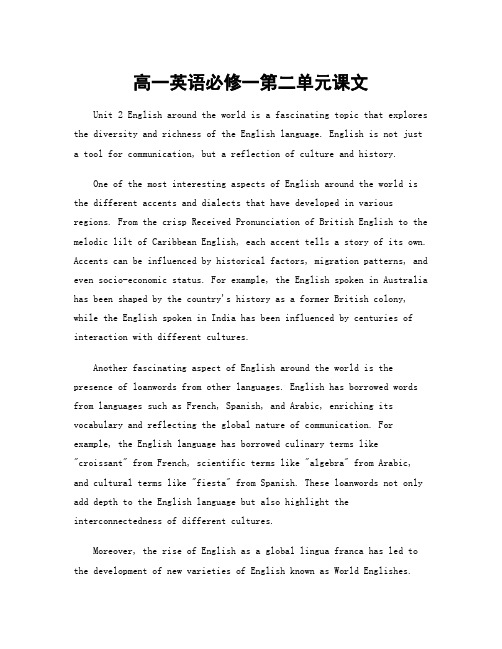
高一英语必修一第二单元课文Unit 2 English around the world is a fascinating topic that explores the diversity and richness of the English language. English is not just a tool for communication, but a reflection of culture and history.One of the most interesting aspects of English around the world is the different accents and dialects that have developed in various regions. From the crisp Received Pronunciation of British English to the melodic lilt of Caribbean English, each accent tells a story of its own. Accents can be influenced by historical factors, migration patterns, and even socio-economic status. For example, the English spoken in Australia has been shaped by the country's history as a former British colony, while the English spoken in India has been influenced by centuries of interaction with different cultures.Another fascinating aspect of English around the world is the presence of loanwords from other languages. English has borrowed words from languages such as French, Spanish, and Arabic, enriching its vocabulary and reflecting the global nature of communication. For example, the English language has borrowed culinary terms like "croissant" from French, scientific terms like "algebra" from Arabic, and cultural terms like "fiesta" from Spanish. These loanwords not only add depth to the English language but also highlight the interconnectedness of different cultures.Moreover, the rise of English as a global lingua franca has led to the development of new varieties of English known as World Englishes.These varieties reflect the unique blend of English with local languages and cultural influences. For instance, Singlish in Singapore combines English with words and expressions from Chinese, Malay, and Tamil. Similarly, Nigerian Pidgin English blends English with indigenous languages to create a vibrant and expressive form of communication. These World Englishes challenge the traditional notion of a standard English and celebrate linguistic diversity.In addition to accents, loanwords, and World Englishes, the spread of English has also had a significant impact on education and employment opportunities. English proficiency is often seen as a gateway to higher education, better job prospects, and greater social mobility. As a result, many non-native English speakers invest time and resources in learning the language, leading to a growing number of bilingual and multilingual individuals around the world.Overall, the study of English around the world is a testament to the power of language to bridge cultural divides and connect people from different backgrounds. As English continues to evolve and adapt to changing contexts, it remains a dynamic and vibrant language that reflects the diversity of the global community. By appreciating the richness of English in all its forms, we can gain a deeper understanding of the world we live in and the people we share it with.。
高一英语必修一Unit2-词汇讲解
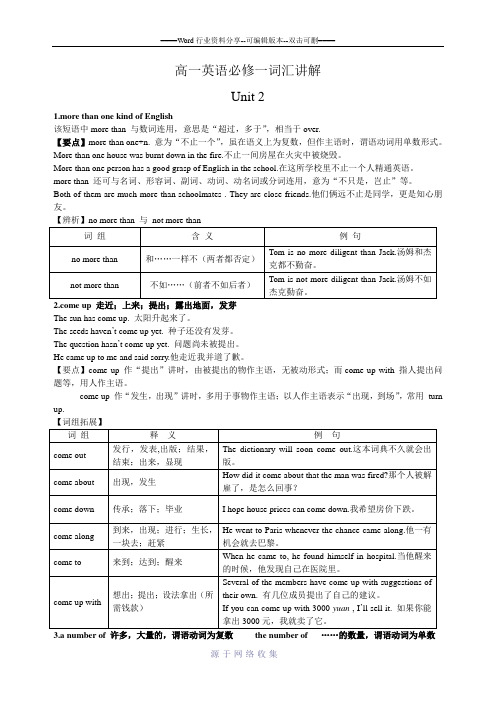
高一英语必修一词汇讲解Unit 21.more than one kind of English该短语中more than 与数词连用,意思是“超过,多于”,相当于over.【要点】more than one+n. 意为“不止一个”,虽在语义上为复数,但作主语时,谓语动词用单数形式。
More than one house was burnt down in the fire.不止一间房屋在火灾中被烧毁。
More than one person has a good grasp of English in the school.在这所学校里不止一个人精通英语。
more than 还可与名词、形容词、副词、动词、动名词或分词连用,意为“不只是,岂止”等。
Both of them are much more than schoolmates . They are close friends.他们俩远不止是同学,更是知心朋友。
【辨析】no more than 与not more thanThe sun has come up. 太阳升起来了。
The seeds haven’t come up yet. 种子还没有发芽。
The question hasn’t come up yet. 问题尚未被提出。
He came up to me and said sorry.他走近我并道了歉。
【要点】come up 作“提出”讲时,由被提出的物作主语,无被动形式;而come up with 指人提出问题等,用人作主语。
come up 作“发生,出现”讲时,多用于事物作主语;以人作主语表示“出现,到场”,常用turn up.3.a number of 许多,大量的,谓语动词为复数the number of ……的数量,谓语动词为单数Quite a number of young people believe that money is a passport to happiness.相当多的年轻人认为金钱是幸福的保证。
新版高一必修一UNIT2

Unit 2Exploring EnglishNeither Pine nor Apple in PineappleHave you ever asked yourself (1)why people often have trouble learning English? I hadn’t, until one day my five-year-old son asked me (2)whether there was ham in a hamburger.There isn’t.This made me realize (3)that there’s no egg in eggplant either.(4)Neither is there pine nor apple in pineapple.This got me thinking (5)how English can be a crazy language to learn.For example, in our free time we can sculpt a sculpture and paint a painting, but we take a photo.And (6)when we are traveling we say that we are in the car or the taxi, but on the train or bus! (7)While we’re doing all this traveling, we can get seasick at sea, airsick in the air and carsick in a car, but we don’t get homesick (8)when we get back home.And speaking of home, why aren’t homework and housework the same thing?(9)If “hard” is the opposite of “ soft”,why are “hardly” and softly not an opposing pair? (10)If harmless actions are the opposite of harmful actions, why are shameless and shameful behaviors the same?(11)When we look out of the window and see rain or snow, we can say “it’s raining” or “it’s snowing”.But (12)when we see sunshine, we can’t say “it’s sunshining”.Even the smallest of words can be confusing.(13)When you see the capitalized“WHO” in a medical report, do you read it as the “who” in “Who’s that?” What about “IT” and “US”?You also have to wonder at the unique madness of a language (14)in which a house can burn up as it burns down, (15)in which you fill in a form by filling it out, and (16)in which an alarm is only heard once it goes off!English was invented by people, not computers, and it reflects the creativity of the human race.(17)That is why when the stars are out, they are visible , but when the lights are out, they are invisible.And that is why when I wind up my watch, it starts, but when I wind up this passage, it ends.(1)why引导宾语从句,why在从句中作原因状语,意为“为什么”。
- 1、下载文档前请自行甄别文档内容的完整性,平台不提供额外的编辑、内容补充、找答案等附加服务。
- 2、"仅部分预览"的文档,不可在线预览部分如存在完整性等问题,可反馈申请退款(可完整预览的文档不适用该条件!)。
- 3、如文档侵犯您的权益,请联系客服反馈,我们会尽快为您处理(人工客服工作时间:9:00-18:30)。
年级三课题
Unit 1
Welcome back
to school
第二课时
备课时间3月2日备课人谭刚娥
教材分析通过Let’s talk部分对话向学生展示怎样介绍新同学以及句型I’m from …的用法。
教学目标
主要学习句型“I’m from …./ Boys and girls ,we have two new friends today它是A部分内容的延伸Let’s practice
巩固、操练对话的句型,鼓励学生在真实情景中会话。
教学重点句型:We have two new friends today. I’m from the UK. 词汇:welcome, USA, Canada
教学难点Welcome的发音,句型“I’m from ….
教学准备教学录音带和头饰。
教学时间一课时
教学过程
(一)热身/复习(Warm-up/Revision)
1.复习第一册所学歌曲“Hello”。
[使用第一册Let’s
sing/A部分配套录音带.
2.对话练习:教师:Hello,A.
学生:Hello,teacher.
教师:Welcome back to school. Nice to see you again.
学生:Nice to see you, too.
请一些学生做此对话练习,由教师和一名学生来做,过渡
到由两名学生来做。
(二)呈现新课(Presentation)
1.师生问侯:
教师:Good morning, boys and girls.
学生:Good morning teacher.
教师:I’m Miss He. I’m from China.(手中举起中国
国旗) And you?
鼓励学生说出:I’m… I’m from China.
2.让更多的学生进行自我介绍:I’m… I’m from…
3.教师:Class, we have a new friend today. 让学生
个人反馈
与建议
教学过程观看教学课件。
[使用Let’s talk A动画课件]教师反复点击对话框中的句子,学生跟读模仿。
4.教师问: What’s the girl’s name? (Amy)
Is she from China? (No)
What does Amy say?
让学生模仿Amy说出:Hi! I’m Amy. I’m from the USA.
学生说完此句后,教师说:Amy! Welcome.
5.教师解释并教读单词:welcome
7.让学生戴上头饰分别扮演Amy, Bai Ling和Mike上台做自我介绍
作业
及要
求
完成《长江全能学案》第二课时练习
板书设计 Unit 1 Welcome back to school
句型“I’m from ….
Boys and girls ,we have two new friends today.
教学反思
由于小学生们没有相应的读音规则训练,不熟悉词汇的拼写规则,单词的音、形、意三者不能有效的结合在一起,因而导致了单词记忆的困难,并成了小学生学英语的瓶颈。
